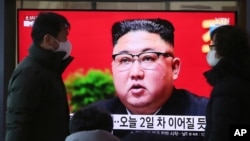North Korean leader Kim Jong Un has threatened to expand his nuclear arsenal and warned his approach toward Washington won’t change with the onset of a new U.S. president.
The comments provide a hint at the direction of U.S.-North Korea relations just days ahead of the inauguration of former U.S. Vice President Joe Biden, who has indicated he will take a more adversarial approach toward Pyongyang.
In a speech at an important meeting of the ruling Workers’ Party, Kim called the U.S. his country’s “biggest enemy” and repeated his long-standing assertion that the U.S. must lift its “hostile policy” in order to establish better ties, according to the official Korean Central News Agency (KCNA).
Kim also called for his country to continue developing nuclear weapons. Notably, he said North Korea should acquire new capabilities, such as solid-fuel intercontinental ballistic missiles, hypersonic missiles, and tactical nuclear weapons.
The comments amount to one of the most important recent declarations from North Korea about its planned qualitative nuclear modernization, said Ankit Panda, a senior fellow in the Nuclear Policy Program at the Carnegie Endowment for International Peace.
Panda, author of Kim Jong Un and the Bomb, said Kim’s statement about acquiring tactical nuclear weapons likely implies a return to nuclear testing.
'Major provocation'
North Korea has conducted six nuclear tests, most recently in September 2017. But more testing would likely be needed to develop tactical nuclear weapons. Tactical nuclear weapons are smaller, more mobile and meant to be used on the battlefield, as opposed to larger strategic nuclear weapons that are designed to inflict mass destruction.
Kim said a year ago he no longer feels bound by his self-imposed pause on nuclear and long-range missile tests, raising fears of a return to major tensions on the Korean Peninsula.
North Korea has often timed major tests, including of ballistic missiles or nuclear weapons, around U.S. presidential transitions to demonstrate its military capabilities and possibly gain leverage in future negotiations with Washington.
In October, North Korea used a military parade to unveil a massive new intercontinental ballistic missile, which appears designed to overwhelm U.S. missile defenses. Some suspect Pyongyang may test the missile or other weapons systems in the coming months. But this week, the top U.S. general in South Korea said there were no signs North Korea was preparing a “major provocation.”
A major weapons test would represent an early foreign policy challenge for Biden, who has said his main priorities are combatting the coronavirus pandemic and improving the U.S. economy.
“There’s a lot demanding his time and attention,” said Jenny Town, a North Korea specialist with the Washington-based Stimson Center.
“Moves like early appointments of a North Korea policy team, lifting the travel ban (on North Korea), and other types of actions would help demonstrate that a different outcome and relationship is possible with a new administration,” Town said. “This is a tall order though, in the current political environment.”
While he hasn’t ruled out meeting Kim face to face, Biden has suggested that may only come as part of broader, working-level talks.
Biden has repeatedly criticized President Donald Trump’s personal outreach to Kim, saying the strategy is ineffective and aimed more at creating headlines than addressing the North Korean nuclear issue.
Trump officials have defended their North Korea approach by pointing out that Pyongyang has refrained from any nuclear or long-range missile tests since the Trump-Kim talks began.
At his election rallies, Biden frequently called Kim a "thug," "tyrant" and "dictator." In response, North Korean state media slammed Biden as an "imbecile," a "fool of low IQ" and a "rabid dog."




